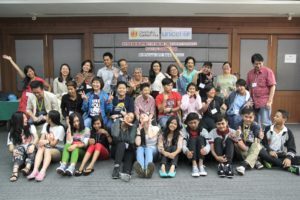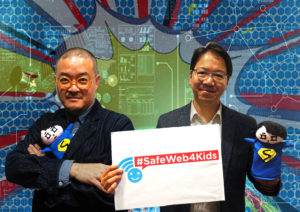by Shirley Wong Lok Yin
If someone threatens you online, what would you do?
To tell you the truth, even though online threats can bring much frustration, given the vastness of this cyber world, what one can actually do is limited. As Hong Kong Social Welfare Legislator Bottle Shiu Ka-chun commented, “Our society has fears but no discussion on the issue of online safety. Hong Kong also does not have enough support services to tackle the problem.”
“Say, if you tell the police someone is threatening to kill your whole family if you do not send them nude photos, what would be the reaction of the police? They would probably say, ‘has he been to your home? If no, then there is no problem…Actually, you need not fear. He said he would strike and kill, but nothing would happen to you. Just turn off the computer, stop surfing the Net and stop visiting that website, then all problems will be solved.’” Bottle exerted, “This is the reality of our government. On the one hand, they would say that we can bring out all our problems to them; but on the other hand, they would tell you that your problem is not a problem, so let it go.”
#SafeWeb4Kids - a New Vision With the Participation of Children
However, “Let it go” is never a satisfying answer. In face of the problem of online safety, children often bear the first blow. According to UNICEF’s latest research, one out of three internet users is under the age of 18. Therefore, this February, through the initiative of UNICEF and Child Rights Coalition Asia, children under the age of 18 coming from seven different countries/places, including Hong Kong, Cambodia, Indonesia, Philippines, Malaysia, Thailand and Vietnam travelled to Bangkok, Thailand to discuss the issue of child online safety. These children from different cultural backgrounds decided to create the #SafeWeb4Kids campaign, a child participation campaign on the issue.

Children coming from seven different countries/places discussed the issue of child online safety at Bangkok, Thailand
From February to July this year, through the participation of children, the campaign was able to produce a Children’s Guide to Online Safety available in eight languages as well as eight short videos about traps that children might encounter online. For the videos, all the themes, scripts and role play were done by children.
In Hong Kong, my organization, the Hong Kong Committee on the Children’s Rights (HKCCR) promotes the #SafeWeb4Kids campaign and materials through our website and Facebook page as well as the Frustrated Superman’s Facebook page. We have launched a series of games, in which the winners received copies of the Children’s Guide and souvenirs.
HKCCR has also distributed more than 400 copies of the Children’s Guide to schools and NGOs. The Education Bureau of Hong Kong has expressed interest in our campaign. They have uploaded resources to the website and have expressed interest in organizing a forum on child online safety with us.

The Hong Kong #SafeWeb4Kids video production team. All the themes, scripts and roleplay were done by children.
Legislator for Information Technology Charles Peter Mok is deeply impressed by the efforts of #SafeWeb4Kids. He thought that this regional advocacy campaign in Southeast Asia could fully manifest the spirit of child participation. “Children themselves would know the best of the biggest problems and the biggest dangers of the cyber world,” he said.
With regard to the possibility of collaboration between IT industry and children, Charles said, “If the IT industry understands the needs of children, then they would have the awareness to consider more on the safety of children when they design apps or websites. I hope that we can sit together with children to brainstorm new ideas and bring the voices of children into the industry, so that we can use technology to solve the problems it brings.”
Between the Web and the Reality
At the end of the day, the web is a mirror of the reality in the sense that it is not without evil. In fact, it is an embodiment of both good and bad, beauty and ugliness. While wishing ourselves good luck, Bottle thought that self-strengthening is crucial, so that even if something bad happens one day, we would know how to face it.
“Avoidance is how people deal with online threats nowadays – ‘We should avoid exposing our personal information,’ ‘We should avoid sharing the information of our family online,’ ‘We should not upload photos of our body online’… I think that this kind of reminders is necessary. This may be the first step. The next step however is to talk about survival skills – how can we actively face online threats?” he stressed.

Legislators Bottle Shiu and Charles Mok expressed their support for #SafeWeb4Kids
It is certain that in face of online threats, avoidance is not a good strategy. Only by equipping and strengthening ourselves can the problem be solved in the long term. The advocacy campaign #SafeWeb4Kids has started discussion on the issue of child online safety in Southeast Asia. Nevertheless, this discussion should not cease as the campaign comes to an end. Our society should recognize the threats and fears online in order to solve the problem.
To know more about the #SafeWeb4Kids campaign and to download the materials, please click here.

About the author: Shirley Wong Lok Yin is an assistant project officer of the Hong Kong Committee on Children’s Rights. She documents and promotes #SafeWeb4Kids, among other projects, in the hopes that more and more people would listen to the voices of children.





